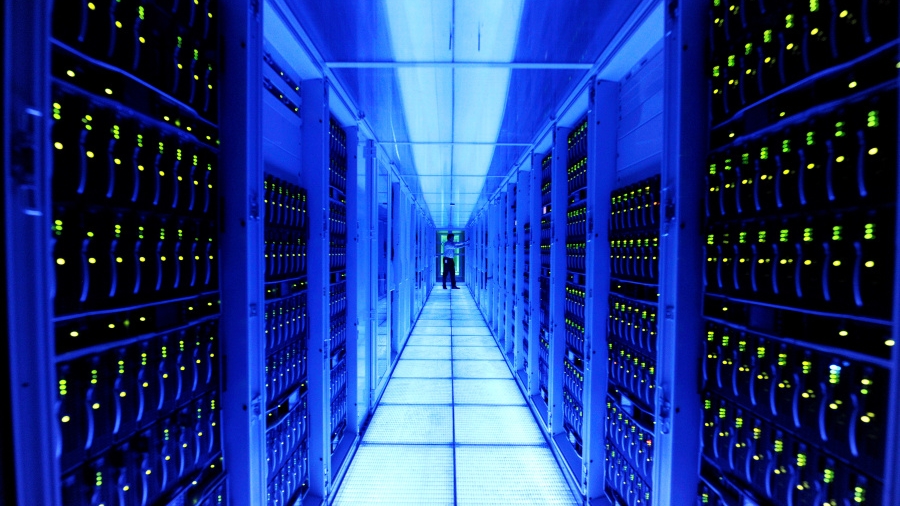China’s Project Stargate rival is pushing new data centers across the country – and swallowing up farmland to do so
By Efosa Udinmwen
Copyright techradar

Skip to main content
Tech Radar Pro
Tech Radar Gaming
Close main menu
the business technology experts
België (Nederlands)
Deutschland
North America
US (English)
Australasia
New Zealand
View Profile
Search TechRadar
Expert Insights
Website builders
Web hosting
Best web hosting
Best office chairs
Best website builder
Best antivirus
Expert Insights
Don’t miss these
Like with EVs, China could flood its domestic market with affordable surplus computer power in a desperate attempt to improve data center viability nationwide
AI’s infrastructure problem is bigger than we think—here’s how to solve it
Global AI usage surge could cause US electricity prices to increase by 18% within years – and that’s just the beginning
Data center expansions could bring destruction to the British countryside – and consumers might foot the bill
Open AI’s massive Project Stargate is already struggling, may be scaled back
Meta pledges to spend billions on AI infrastructure – but will this help it catch up in the AI race
Data center infrastructure is the “unsung foundation” of the Government’s ambitious AI agenda
Stargate is back on – OpenAI and Oracle unveil massive data center expansion plans in major AI push
A massive Wyoming data center will soon use 5x more power than the state’s human occupants – but no one knows who is using it
Sam Altman’s vision for AI is huge – but there’s just one thing standing in his way
Huawei throws massive 1-million NPU gauntlet at Nvidia and AMD as it positions itself an alternative to US AI giants
Chaos at DeepSeek as R2 launch crashes into hardware problems – rivals gain huge advantage
China could move away from Nvidia AI chips quicker than expected after brash ‘addiction’ comments from US Commerce Secretary
Meta unveils new plans for multi-gigawatt datacenter clusters the size of Manhattan
Microsoft announces “world’s most powerful data center” in latest billion-dollar AI spending splurge
China’s Project Stargate rival is pushing new data centers across the country – and swallowing up farmland to do so
Efosa Udinmwen
27 September 2025
Idle inland data centers reveal flaws in China’s earlier expansion strategy
When you purchase through links on our site, we may earn an affiliate commission. Here’s how it works.
(Image credit: Future)
China turns farmland into data centers to compete with American AI dominance
Wuhu’s $37 billion project highlights Beijing’s urgency in artificial intelligence
Export restrictions leave China relying heavily on less powerful local chips
China’s ambitions in artificial intelligence have gained new visibility through its plan to develop a domestic alternative to the massive Project Stargate being pursued in the United States by OpenAI and Oracle.
While the American initiative is expected to support up to two million AI chips, Beijing is advancing its own version anchored by a $37 billion project in Wuhu.
Although far smaller than the $500 billion price tag linked to Stargate, the Chinese project is designed to consolidate existing computing capacity into a more centralized network.
You may like
Like with EVs, China could flood its domestic market with affordable surplus computer power in a desperate attempt to improve data center viability nationwide
AI’s infrastructure problem is bigger than we think—here’s how to solve it
Global AI usage surge could cause US electricity prices to increase by 18% within years – and that’s just the beginning
The Wuhu project and its scale
The site selected for this project is in Wuhu, eastern China, and it covers former rice fields along a 760-acre island in the Yangtze River basin.
This land, once devoted to food production, is being converted into a “data island” for four of the country’s largest technology operators: Huawei, China Mobile, China Telecom, and China Unicom.
By situating the new “mega-cluster” of data centers near major cities such as Shanghai, Hangzhou, and Nanjing, planners hope to deliver faster inference services to dense urban populations.
Beginning in 2022, China encouraged the construction of server farms in interior provinces with cheap power supplies.
Are you a pro? Subscribe to our newsletter
Sign up to the TechRadar Pro newsletter to get all the top news, opinion, features and guidance your business needs to succeed!
Contact me with news and offers from other Future brandsReceive email from us on behalf of our trusted partners or sponsorsBy submitting your information you agree to the Terms & Conditions and Privacy Policy and are aged 16 or over.
Yet these sites often sat idle, as local governments reallocated capacity to areas where demand was higher.
The new plan attempts to fix that by linking both urban and remote data centers through Huawei’s UB-Mesh technology.
This technology can provide redundancy while allowing unused compute power to be sold.
You may like
Like with EVs, China could flood its domestic market with affordable surplus computer power in a desperate attempt to improve data center viability nationwide
AI’s infrastructure problem is bigger than we think—here’s how to solve it
Global AI usage surge could cause US electricity prices to increase by 18% within years – and that’s just the beginning
The Wuhu project’s subsidies, which reportedly cover as much as 30% of AI chip procurement costs, further reflect Beijing’s urgency to make the new clusters operational.
China currently holds about 15% of global AI compute power, far less than the United States’ estimated 75%.
Export restrictions have blocked access to advanced GPUs from Nvidia, leaving domestic suppliers unable to fully match foreign performance.
That gap has created incentives for smuggling hardware, although officials seem intent on developing self-sufficient AI stacks to reduce dependence on overseas sources.
The long-term aim is that such infrastructure will allow both companies and individuals to deploy more sophisticated AI tools.
Whether local chips can support this ambition remains uncertain compared to Western options powering major data centers abroad.
The conversion of farmland into server space raises questions about sustainability, resource allocation, and energy demand.
Supporters view the projects as vital for narrowing the technological divide, while skeptics point out the costs of diverting agricultural land and the uncertainty of relying on less powerful local chips.
Via Toms Hardware
You might also like
Expert says $5 kitchen gadget could help you live longer by making you use your standing desk better
These are the best cloud hosting providers
We’ve listed all of the best AI writers available at the moment
Efosa Udinmwen
Freelance Journalist
Efosa has been writing about technology for over 7 years, initially driven by curiosity but now fueled by a strong passion for the field. He holds both a Master’s and a PhD in sciences, which provided him with a solid foundation in analytical thinking. Efosa developed a keen interest in technology policy, specifically exploring the intersection of privacy, security, and politics. His research delves into how technological advancements influence regulatory frameworks and societal norms, particularly concerning data protection and cybersecurity. Upon joining TechRadar Pro, in addition to privacy and technology policy, he is also focused on B2B security products. Efosa can be contacted at this email: udinmwenefosa@gmail.com
You must confirm your public display name before commenting
Please logout and then login again, you will then be prompted to enter your display name.
Like with EVs, China could flood its domestic market with affordable surplus computer power in a desperate attempt to improve data center viability nationwide
AI’s infrastructure problem is bigger than we think—here’s how to solve it
Global AI usage surge could cause US electricity prices to increase by 18% within years – and that’s just the beginning
Data center expansions could bring destruction to the British countryside – and consumers might foot the bill
Open AI’s massive Project Stargate is already struggling, may be scaled back
Meta pledges to spend billions on AI infrastructure – but will this help it catch up in the AI race
Latest in Pro
Watch out – hackers are using AI to make phishing emails even more convincing
Nearly 150,000 patient records exposed in major healthcare data breach – here’s what we know
This graph alone shows how global AI power consumption is getting out of hand very quickly – and it’s not just about hyperscalers or OpenAI
This devious malware has jumped from Meta over to Google Ads and YouTube to spread – here’s how to stay safe
Microsoft flags dangerous XCSSET macOS malware targeting developers – so be on your guard
I helped create Amazon’s Alexa – here’s why I think businesses should embrace humanity’s analogous imperfection to succeed
Latest in News
YouTube Music is testing a new feature that sounds a lot like Spotify’s AI DJ
New Samsung Galaxy Z Tri-fold leaks hint at key software and camera zoom features
You can now use Google’s viral Nano Banana AI directly in Photoshop
ICYMI: the week’s 7 biggest tech stories from Apple’s response to ‘Scratchgate’ and the ROG Xbox Ally’s price reveal
Is the DJI Mini 5 Pro really a legal nightmare? Here’s what the world’s big drone regulators told me
Quordle hints and answers for Sunday, September 28 (game #1343)
TechRadar is part of Future US Inc, an international media group and leading digital publisher. Visit our corporate site.
Contact Future’s experts
Terms and conditions
Privacy policy
Cookies policy
Advertise with us
Web notifications
Accessibility Statement
Future US, Inc. Full 7th Floor, 130 West 42nd Street,
Please login or signup to comment
Please wait…



